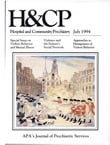Clinical Symptoms, Neurological Impairment, and Prediction of Violence in Psychiatric Inpatients
Abstract
The study sought to identify basic clinical symptoms of violent inpatients and to determine the relationship between these symptoms and two outcome measures: whether violence was persistent or transient, and length of stay on a secure care unit designed to control violent behavior. Methods: Thirty-eight patients consecutively admitted to the secure care unit were assessed using a quantified neurological scale, the Brief Psychiatric Rating Scale, and a modified version of the Social Participation Rating Scale, which measured participation in unit activities. Because there was considerable overlap among these clinical measures, factor analysis was applied to isolate underlying clinical factors. Results: Factor analysis consistently identified two independent factors at different time points. The first factor, which consisted of various psychiatric symptoms and behavioral abnormalities, was indicative ofgeneral impairment. The second factor was bipolar, reflecting a positive association with neurological impairment and a negative association with paranoid symptoms. A differential association between these two factors and the outcome variables was found. Length of stay, a measure of perceived dangerousness, was best predicted by the general impairment factor, whereas persistent violence was predicted primarily by the bipolar factor. Conclusions: The data confirmed an association between persistent violence and neurological impairment. The study underscores the needfor differential treatment of violent behavior in psychiatric inpatients, as different psychopathological processes might be involved.
Access content
To read the fulltext, please use one of the options below to sign in or purchase access.- Personal login
- Institutional Login
- Sign in via OpenAthens
- Register for access
-
Please login/register if you wish to pair your device and check access availability.
Not a subscriber?
PsychiatryOnline subscription options offer access to the DSM-5 library, books, journals, CME, and patient resources. This all-in-one virtual library provides psychiatrists and mental health professionals with key resources for diagnosis, treatment, research, and professional development.
Need more help? PsychiatryOnline Customer Service may be reached by emailing [email protected] or by calling 800-368-5777 (in the U.S.) or 703-907-7322 (outside the U.S.).



